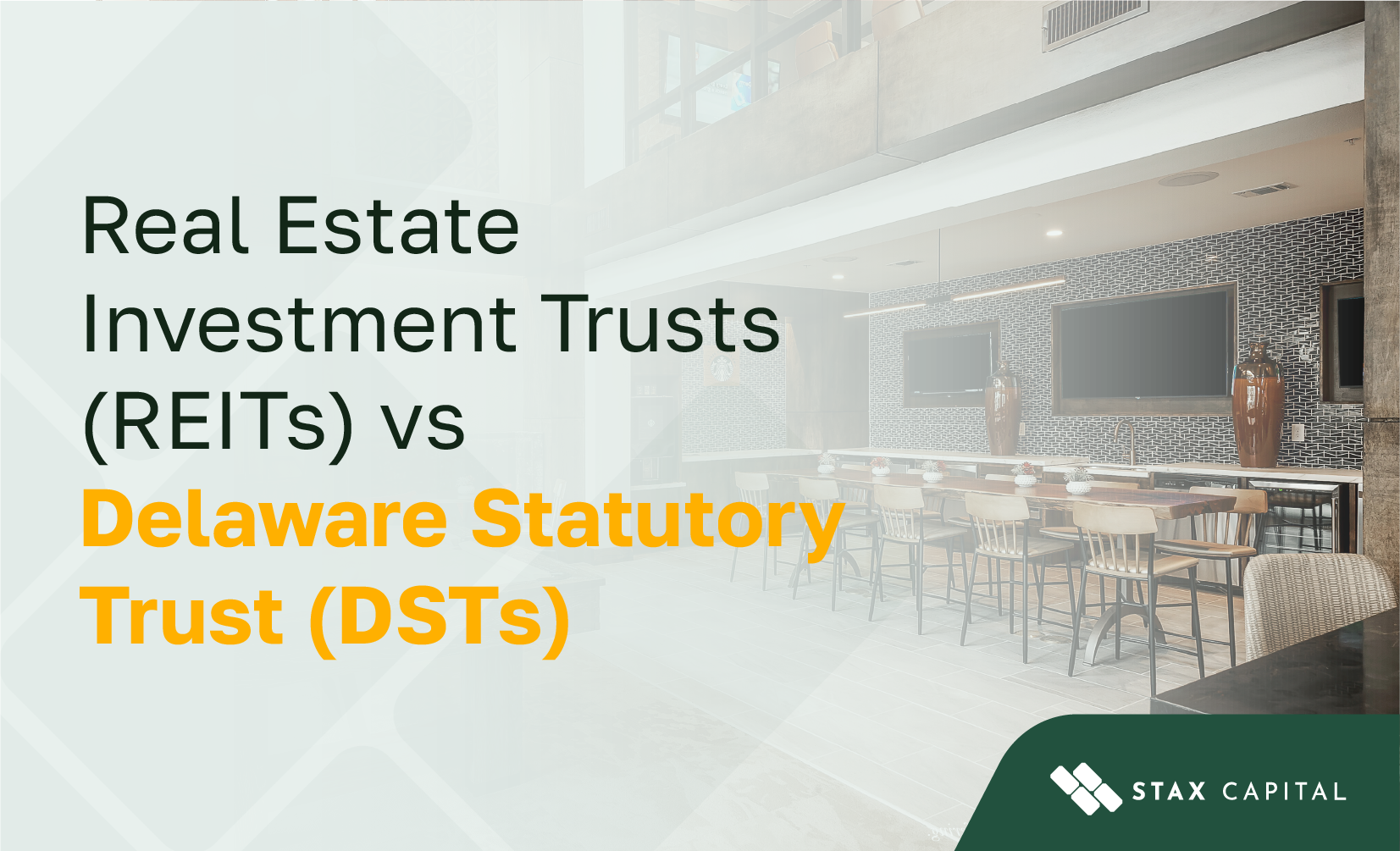721 Exchange Pros and Cons: Is It the Right Choice for You?

Selling an investment property can mean a hefty tax bill. But what if there was a way to defer taxes while transitioning into a different real estate investment structure?
That’s where a 721 Exchange comes in. This strategy allows you to swap real estate for shares in a Real Estate Investment Trust (REIT), offering potential liquidity and hassle-free ownership.
But is it the right move for you? In this article, we’ll explore what a 721 Exchange offers, its limitations, and how to decide if it’s the right path for your investment strategy.
What Is a 721 Exchange?
A 721 Exchange is a tax-deferred strategy that allows real estate investors to swap their property for ownership in a Real Estate Investment Trust (REIT). Instead of selling your property and paying capital gains taxes, you contribute it to an Umbrella Partnership Real Estate Investment Trust (UPREIT).
In return, you receive Operating Partnership (OP) Units, which act like shares in the REIT. Over time, you can convert these units into publicly traded REIT shares, giving you liquidity and diversification.
The biggest advantage? You transition from hands-on property management to completely passive ownership—without an immediate tax hit.
Pros of a 721 Exchange
Tax Deferral
A key advantage of a 721 Exchange is the potential to defer capital gains taxes. However, tax deferral is subject to compliance with IRS regulations and could result in future tax liabilities. Investors should consult a tax advisor to understand the long-term implications.
When you sell an investment property the traditional way, the IRS takes a big cut in the form of capital gains taxes. But with a 721 Exchange, you contribute your property to a Real Estate Investment Trust (REIT) instead of selling it outright.
Since this is a like-kind exchange, the IRS allows you to defer taxes on your gains. That means more of your money stays invested and working for you rather than going to the government. Over time, this can significantly increase your overall returns. However, future tax liabilities may apply when OP Units are converted into publicly traded REIT shares.
Passive Ownership
Tired of dealing with tenants, maintenance, and property management? A 721 Exchange lets you step away from active real estate management and move into fully passive investing.
After exchanging your property for Operating Partnership (OP) Units, the REIT management team assumes control of property operations, including leasing, maintenance, and sales. No more late-night repair calls. No more worrying about vacancies. Just hands-off investing with professional management. While this provides passive ownership, returns are not guaranteed and will depend on the REIT’s performance and market conditions.
Diversification
Instead of having all your wealth tied up in a single property, a 721 Exchange lets you spread your investment across a diverse portfolio of properties.
REITs typically own high-value commercial properties like office buildings, apartment complexes, shopping centers, and industrial facilities. When you exchange your property, you become a part-owner of this portfolio. This diversification reduces risk and provides more stable, long-term returns compared to owning a single property.
Even if one sector underperforms, the diversified nature of a REIT’s holdings may help mitigate individual asset risks. However, diversification does not guarantee profit or protection against losses.
Potential Liquidity
Real estate investments are traditionally illiquid, meaning it’s hard to sell quickly if you need cash. But a 721 Exchange offers a path to liquidity. Upon completing a 721 Exchange, investors receive Operating Partnership (OP) Units, which are not immediately tradable.
Over time, and subject to REIT policies, these units may be converted into publicly traded REIT shares. This means you can eventually turn your real estate into a liquid, tradable investment—a major advantage for investors who want both long-term stability and financial flexibility.
However, liquidity is not guaranteed, and conversion policies vary by REIT. Investors should carefully evaluate the holding period requirements before proceeding.
Estate Planning Benefits
Passing down investment properties can be complicated. Estate taxes and management hassles often burden heirs. A 721 Exchange helps simplify this process.
Instead of leaving behind physical properties, you pass down Operating Partnership (OP) Units—a far easier asset to inherit. Your heirs won’t have to worry about managing tenants, handling maintenance, or selling real estate. Plus, when they inherit OP Units, the cost basis resets to the current market value. This can eliminate capital gains taxes that would otherwise apply if the property were sold during your lifetime.
This strategy makes a 721 Exchange a powerful tool for estate planning. It allows you to pass on wealth without passing on headaches. However, tax treatment varies based on current laws and personal circumstances. To fully understand the implications, investors should consult an estate planning professional.
Cons of a 721 Exchange
No Future 1031 Exchanges
A 1031 Exchange allows real estate investors to defer capital gains taxes by rolling profits into another investment property. But once you complete a 721 Exchange, you lose that ability.
Here’s why: When you contribute your property to a Real Estate Investment Trust (REIT), you receive Operating Partnership (OP) Units instead of real estate. While these units can later convert into REIT shares, the IRS does not consider them “like-kind” real estate. This means that once you convert your OP Units to publicly traded REIT shares, you can no longer do a 1031 Exchange.
If keeping the option for future tax-deferred exchanges is important to you, a 721 Exchange might not be the best fit. However, some REITs offer structured programs that may provide alternative tax-deferral options.
Illiquidity (Initially)
Unlike publicly traded REIT shares, Operating Partnership (OP) Units) are not immediately liquid. This means that while you’ve transitioned into a passive investment, you won’t be able to sell your OP Units right away if you need quick access to cash.
Most REITs require investors to hold OP Units for a certain period before converting them into publicly traded shares. The timeline can vary depending on the REIT’s policies, but it’s often several years.
If liquidity is a top priority, be sure to understand the conversion timelines before moving forward with a 721 Exchange.
Limited Control
When you own a property, you have full control—you decide when to sell, who to rent to, and how to manage expenses. In a 721 Exchange, all of that changes.
Once you contribute your property to a REIT, the REIT’s management team makes all the investment decisions. They handle everything from property selection to leasing, maintenance, and selling assets. While this is great for hands-off investing, it also means you lose control over your investment.
If you prefer to have a direct say in how your real estate is managed, this might be a major drawback.
Potential Tax Consequences
While a 721 Exchange helps you defer capital gains taxes when you contribute your property, future tax liabilities can still arise.
Here’s how:
- When you convert OP Units into REIT shares, the IRS recognizes this as a taxable event. That means you may owe capital gains taxes at the time of conversion.
- Dividends from REIT shares are taxed as ordinary income, which can be higher than the tax rate on long-term capital gains.
This means that while a 721 Exchange helps you defer taxes initially, it doesn’t eliminate them completely. Planning ahead is crucial to avoid unexpected tax bills down the road. Investors should consult a tax professional to understand their specific tax liabilities.
REIT Risks
REITs provide diversification and professional management, but they still carry market risks.
Unlike direct real estate ownership, where values tend to move slowly, publicly traded REIT shares can fluctuate based on stock market conditions. This means that even if the underlying real estate is performing well, external market factors—such as interest rate changes, economic downturns, or investor sentiment—can affect your share value.
If you plan to hold your investment long-term, this may not be a major concern. But if market volatility worries you, a 721 Exchange may not be the right fit. Investors should assess their risk tolerance before committing to a 721 Exchange.
Who Should Consider a 721 Exchange?
A 721 Exchange isn’t the right fit for everyone. But for the right investor, it can be a powerful wealth-building strategy that simplifies real estate ownership while keeping money invested. Here’s who benefits the most:
Investors Looking to Consolidate and Simplify
Managing multiple properties takes time, effort, and resources. If you’ve recently sold off some real estate or want to reduce the hassle of owning many properties, a 721 Exchange can help.
Why it works: Instead of handling multiple properties, you transition into a diversified real estate portfolio without triggering immediate tax bills.
Best for: Investors looking to streamline holdings and reduce the burden of active property management.
Investors Who Want to Defer Capital Gains Taxes
Selling real estate can mean huge capital gains taxes. But a 721 Exchange lets you defer those taxes and keep your money growing inside a REIT.
Why it works: Just like a 1031 Exchange, you avoid immediate taxes by rolling your property into a professionally managed REIT.
Best for: Investors who want to sell without a massive tax hit and reinvest in real estate.
Investors Who Want a Break from Property Management
Are you tired of tenants, repairs, and unexpected expenses? A 721 Exchange lets you step away from hands-on management and shift into passive ownership.
Why it works: By exchanging your property for Operating Partnership (OP) Units, you gain exposure to a professionally managed real estate portfolio—no landlord duties required.
Best for: Investors looking for passive income while eliminating landlord headaches.
Investors Looking for Diversification
Owning a single property—or even a handful—concentrates your risk in one market. A 721 Exchange helps you spread out that risk by converting your holdings into a diverse REIT portfolio.
Why it works: REITs own multiple property types across different locations, offering more stability than investing in just one or two properties.
Best for: Investors who want to reduce risk and gain exposure to a broader range of real estate assets.
Investors Seeking Reliable Passive Income
If you’re seeking an alternative to active property management, a 721 Exchange allows for potential passive income. However, income distributions are subject to REIT performance and are not guaranteed.
Why it works: Investors may receive periodic income distributions from the REIT’s revenue-generating assets. However, these payments are subject to REIT performance and are not guaranteed.
Best for: Investors who want a consistent income stream without day-to-day involvement in real estate.
Who Should Avoid a 721 Exchange?
A 721 Exchange offers tax deferral, passive income, and diversification, but it’s not the right fit for everyone. Here’s who should think twice before making the move:
Investors Who Want to Keep Using 1031 Exchanges
Once you complete a 721 Exchange, you can no longer do a 1031 Exchange in the future. That means you lose the ability to keep deferring taxes through property swaps.
Why it’s a problem: If you prefer rolling your real estate profits into new properties instead of REIT shares, a 1031 Exchange is the better choice.
Who should avoid it? Investors who want to keep trading properties while deferring taxes.
Investors Who Need Immediate Liquidity
A 721 Exchange doesn’t give you cash right away. Instead, you receive Operating Partnership (OP) Units, which are not immediately tradable.
Why it’s a problem: OP Units must be held for a certain period before they can be converted into REIT shares and sold. If you need quick access to cash, this strategy may not work for you.
Who should avoid it? Investors who need immediate liquidity or plan to cash out soon.
Investors Who Want Full Control Over Their Assets
When you swap your property for REIT shares, you give up decision-making power. The REIT management team handles acquisitions, leasing, and sales—you just collect dividends.
Why it’s a problem: If you enjoy making investment decisions, managing properties, and having full control, a 721 Exchange might feel too restrictive.
Who should avoid it? Hands-on investors who prefer managing their own real estate portfolio.
Investors Concerned About Market Volatility
REIT shares fluctuate with the stock market, meaning their value can rise or fall based on economic conditions, interest rates, and investor sentiment.
Why it’s a problem: Unlike physical real estate, REIT values can be affected by market downturns, potentially leading to losses. If you want stable property ownership, this may not be the right move.
Who should avoid it? Investors who prefer real estate’s long-term stability over market-driven fluctuations.
Investors Who Want Predictable Tax Outcomes
A 721 Exchange allows for tax deferral, but when you eventually convert OP Units into REIT shares and sell them, capital gains taxes and income tax may apply.
Why it’s a problem: Depending on how long you hold the shares, you could face unexpected tax consequences when cashing out.
Who should avoid it? Investors who want full clarity on future tax obligations before making a move.
Final Thought: Is a 721 Exchange Right for You?
A 721 Exchange offers tax deferral, passive income, and diversification. But it also comes with trade-offs. Once you convert Operating Partnership (OP) Units into REIT shares, you lose the ability to do a 1031 Exchange. This means you may face future tax liabilities when you sell your shares.
Unlike direct real estate ownership, REIT investments are tied to the stock market. Their value can rise or fall based on market trends, interest rates, and economic conditions. Plus, you won’t control property decisions—REIT management handles acquisitions, sales, and operations.
Before deciding, speak with a tax professional, financial advisor, or estate planner. Make sure a 721 Exchange fits your long-term investment goals and financial plan.
If you’re considering a 721 Exchange and want to explore your options, contact Stax Capital today to discuss your next steps.



Share: